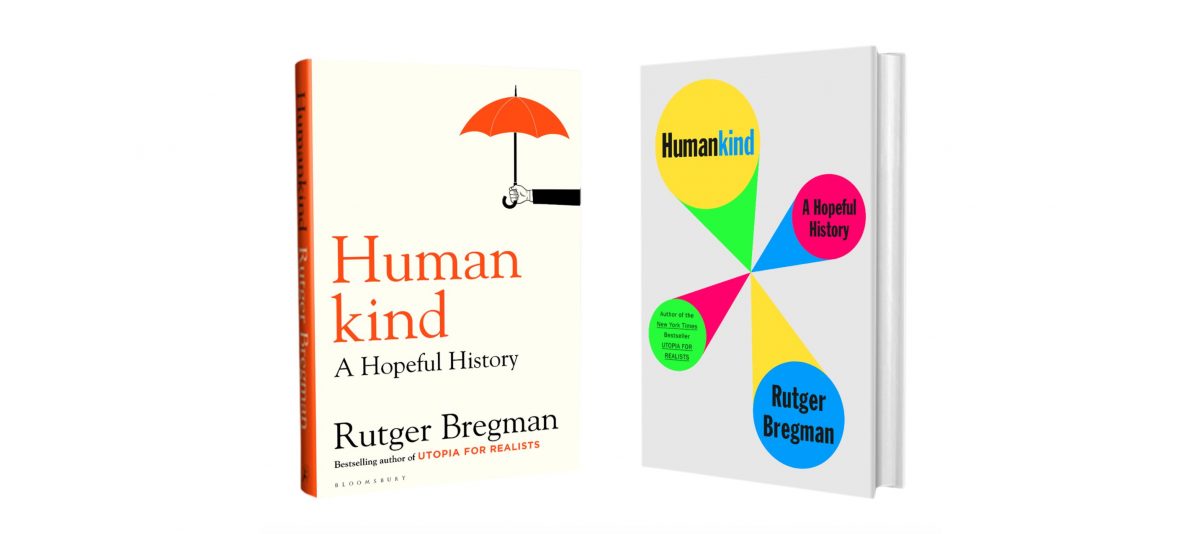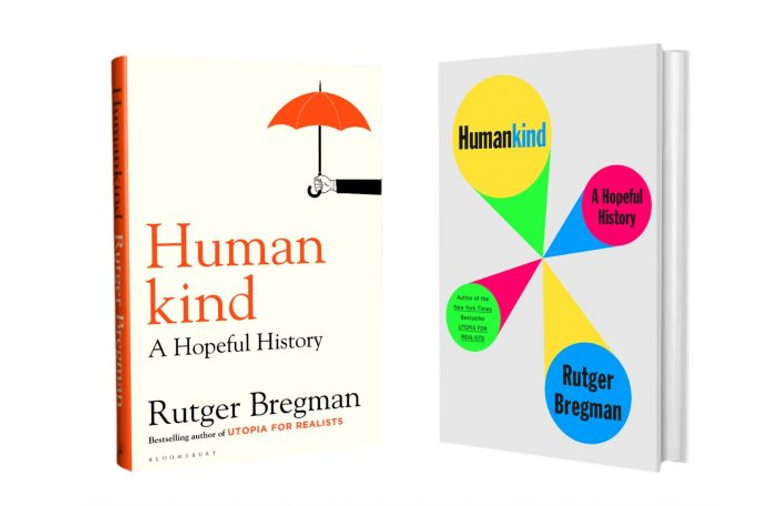So many times, in conversations with friends reflecting on things we see happening in the world, someone will say “well, basically we’re all shit aren’t we?” Or “human beings are basically vile aren’t they?” Or words to that effect. This belief in a selfish, destructive, greedy, violent core to our being is deeply pervasive and underpins so many of the systems that are proving so damaging to the world. Rutger Bregman’s new book, ‘Human Kind’, turns that toxic nonsense on its head and argues that, in essence, “most people, deep down, are decent”, and that the world would be a very different place if we were to recognise that. It may be one of the most important books you will ever read.
Bregman writes,
“if we believe most people can’t be trusted, that’s how we’ll treat each other, to everyone’s detriment. Few ideas have as much power to shape the world as our view of other people. Because, ultimately, you get what you expect to get. If we want to tackle the greatest challenges of our times – from the climate crisis to our growing distrust of one another – then I think the place we need to start is our view of human nature”.
Bregman begins by revisiting all of the ‘scientific’ research and works of fiction that we have been continually told shows that we are, essentially, selfish and horrible, and looks at it with fresh eyes. ‘Lord of the Flies’? Most UK-based readers of this will have studied this book in school, a book that shows how, when left to their own devices, kids turn on each other and act out the worst impulses of adult society. In reality, in the only recorded case of a group of kids actually being washed up onto a desert island, in the 1960s, they behaved remarkably, creating gardens, fishing, looking after each other, creating effective conflict resolution and decision-making processes. ‘Lord of the Flies’ turns out to tell us more about William Golding’s own mental state and politics than it does about actual, real life kids.
That research by Stanley Milgram where a succession of students supposedly electrocute a stranger (an actor) in another room until he ‘dies’, just because someone is telling them to? Deeply suspect and the actual findings were very different. The Stanford Prison Experiment, where some students became ‘guards’ in a prison and others became prisoners and they ended up acting out a brutally enforced hierarchy? It didn’t actually happen like that, and in later attempts to repeat that study, people mostly actually act very socially with each other. Without a lot of interference and provocation from production teams, reality TV shows like Love Island would actually make for very boring reality TV!
But what about soldiers in wars? It turns out that the large majority of soldiers in a war never actually kill another soldier, most deaths in wars happen from shelling, bombing, things that are done from a distance. Actually killing someone is something most of us recoil from. Through example after example, Bregman unpicks the stories that we think show how inherently horrible we are and shows that in fact, it’s not quite like that. He dismisses what is called the ‘veneer theory’, which suggests that “civilisation is nothing more than a thin veneer that will crack at the merest provocation”, and argues that, in reality, the opposite is true. If the pessimists were to be believed, the coronavirus lockdown should have led to breakdown and chaos. In fact it resulted in arguably one of the greatest acts of social solidarity and, dare I say it, love, in peacetime. As Bregman writes, “it’s when crisis hits — when the bombs fall or the floodwaters rise — that we humans become our best selves”.
He unpicks the anthropological evidence that we have been told shows that we evolved through ‘survival of the fittest’, so that traits of ruthlessness and aggression were rewarded, and argues that in fact the opposite is true, that the most sociable, community-minded, collaborative genes were the ones that were passed on.
The problem, where we go wrong, he argues, is power. Power often acts, in people who have it, like brain damage. “Not only are they more impulsive, self-centred, reckless, arrogant and rude than average, they are also more likely to cheat on their spouses, are less attentive to other people and less interested in others’ perspectives”, he writes. “Power”, he adds, “appears to work like an anaesthetic that makes you insensate to other people”. In indigenous cultures or nomadic people he argues, such behaviour would not be tolerated, but we have managed to create a culture which rewards and celebrates it. Starting with the concept of owning, and buying and selling land, he argues that we started to be led down a path towards a mistaken model of human nature.
Having set out his case that everything we thought we knew about how rotten we all are is, in fact, based on propaganda, advertising and bad science, he then, in what is for me the most fascinating part of the book, explores how different the world might be if we based our actions on a fundamental belief in the innate goodness of other people?
What might our education system be like if it respected and celebrated the innate goodness and curiosity of children? He visits a school that suggests that in many ways this is an effective and appropriate way to work with young people. And in an exploration especially pertinent in these times of the discussions stimulated by Black Lives Matter, he asks what would our criminal justice system be like if we assumed the best of people? He juxtaposes the US criminal justice system with that of Norway, whose prisons are more like country retreats, where warders are encouraged to have conversations and to interact with inmates, and where there are activities and constructive things for people to do, and prisons are set in beautiful forested locations. When your system assumes the worst of people, especially people of colour, you can end up with endless cycles of offending and reoffending, with people becoming more and more brutalised, and more and more of a danger when they are released. The Norwegian system costs more, but saves so much money elsewhere across society, and has a fraction of the reoffending rate.
One of the problems we face, he argues, is that the media, and social media in particular, has magnified our worst traits, our worst aspects, and led to us believing the worst of each other. He writes, “when we hole up in our own trenches, we lose sight of reality. We’re lured into thinking that a small, hate-mongering minority reflects all mankind. Like the handful of anonymous internet trolls that are responsible for almost all the vitriol on Twitter and Facebook”. Believing other people to be “hardwired to be kind” isn’t soft, or sentimental, or delusional, he argues, it is what the evidence overwhelmingly suggests. Not perfect, or without flaws, or incapable of poor behaviour, but fundamentally ok. It is distance from each other that brings out the worst in us. We can do things to each other with a drone strike that we could never do face-to-face. And distance, as he writes, “has enabled the most horrifying crimes in history, from slavery to the Holocaust”.

What does all of this imply for the Transition movement? For me it suggests that our fundamental belief in people, in communities, in peoples’ ability to do amazing things when they work together, is entirely sensible. That putting at the heart of our projects a belief that working with other people is good, that people want to support the places they live, that we can work together and affect change, is absolutely the right way to proceed, as I have observed in community after community after community.
His closing advice?
“So be realistic. Be courageous. Be true to your nature and offer your trust. Do good in broad daylight, and don’t be ashamed of your generosity. You may be dismissed as gullible and naïve at first. But remember, what’s naïve today may be common sense tomorrow”. Amen to that.
The years of rampant neoliberalism, austerity and the economics of ‘dog-eat-dog’ were underpinned by core texts such as Richard Dawkins’ ‘The Selfish Gene’ that argued that deep in our fundamental make-up we are programmed for selfishness. It is my strong hope that this book has arrived at absolutely the right time, to underpin a new world view based on belief in the fundamental goodness and integrity of other people. Indeed we already see it emerging in what Corinna Burkhart, Nina Treu and Matthias Schmelzer call the ‘mosaic of alternatives’, co-ops, P2P projects, Doughnut Economics, Transition initiatives, Black Lives Matter, and the whole tapestry of great projects rising up around the world, all rooted in a fundamental belief that the problems in the world lie not in people, but rather in the power structures and institutions that we have allowed to be created.
Essential reading.






